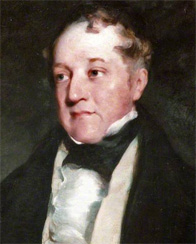| Profile | Major Works | Resources |
William Huskisson, 1770-1830

British financier and statesman, sometime economist, a fellow-traveler of the Classical Ricardians..
Born the son of a well-connected physician, William Huskisson spent a good part of his teenage years in Paris in the 1780s, where his father served the British Ambassador and witnessed the French Revolution first-hand. Huskisson's interest in finance was sparked by the chaos surrounding the revolutionary assignats.
After returning to Britain in 1792, his impressions of France sought, Huskisson fell into the political circle of Pitt the Younger, and shared similar liberal laissez-faire instincts.. In 1796, Huskisson successfully stood for parliament, where he would remain for much of the rest of his life, switching seats every once in a while. In 1804, Pitt appointed Huskisson Secretary of the Treasury. After Pitt's death in 1806, his growing reputation as an expert in finance allowed him to return as Secretary in the 1807 coalition government of the Duke of Portland, although he would resign along with the rest of his faction of liberal Tories (now led by George Canning) in 1809. For much of the next decade, Huskisson would be one of the principle opponents of the Liverpool government.
In 1809, Huskisson jumped into the Bullionist controversy, publishing a pamphlet backing Ricardo's call for the restoration of specie convertibility. Huskisson was one of the more active figures on the famous Bullion Committee of 1810-11 and again in the Peel Committee of 1819. A liberal, Huskisson was a guiding force behind the relaxation of the Corn Laws in 1821 and the resumption of specie act.
The economic crisis and repression of the turn of the 1820s had turned the old Tory government of Robert Jenkinson (Lord Liverpool) quite unpopular. In order to shake things up, Liverpool invited four members of the liberal Tories faction (George Canning, Robert Peel, Frederick Robinson and Huskisson) to join his government. Huskisson was appointed president of the Board of Trade in 1823, and immediately set about instituting many of the liberal reforms he had previously urged from the floor. Huskisson relaxed the Navigation Acts (allowing the principle of reciprocity to govern colonial trade), simplified and cut as many extraneous tariffs as he could, helped the new chancellor, Frederick J. Robinson, put an end to the miserable Sinking Fund, and, in his most famous act, lifted the laws restricting the movement of labor and organized the repeal of the Combination Acts in 1824, allowing workers at long last to unionize. The sharp financial Crisis of 1825 - in part brought about by the speculative excesses of the "prosperous" new ministry - renewed labor unrest and forced the restoration of some restrictions on union activity.
The crisis settled, Huskisson turned his guns on the hated Corn Laws. He was in the process of pushing a weakening amendment when Liverpool suddenly got a stroke and was forced to retire. Liberal George Canning took over as PM, but the old Tories (now led by Wellington) would not serve under him, particularly when Canning felt bold enough to demand Catholic emancipation and Parliamentary reform.. Although, at Huskisson's push, the Corn Laws were reformed in 1827-28, with a sliding scale of import duties rather than outright prohibition, all other business of government ground to a halt in the acrimony. When Canning himself died later that year, the mantle of leadership of the liberal Tory faction fell upon Huskisson (albeit with Robinson as figurehead PM), but there was hardly any liberal Tories left - the more liberal ones had defected to the Whigs, the more Tory ones to Wellington.
The Robinson government collapsed in January 1928, and the Duke of Wellington formed a conservative Tory government. Huskisson stayed on for a few months, but resigned by May, soon followed by other liberal Tories.
That same year, 1828, William Huskisson tried to endow a chair in political economy at Cambridge University (on much the same terms as Drummond had endowed his at Oxford), on the condition that someone other than George Pryme (long-time lecturer at Cambridge since 1816) take the chair. But Cambridge refused.
Huskisson's death made history as the world's first fatal railway casualty. On September 15, 1830, Huskisson was among the dignitaries invited to the opening of the Liverpool & Manchester Railway, the first proper railroad dedicated to steam locomotives. Having dallied on the rails during a stop, Huskisson was run over and killed by the train. News of Huskisson's death, written up in newspapers everywhere, actually helped popularize news about the L&MR, and the novelty of the no-horse railway.
|
Major Works of William Huskisson
|
|
HET
|
|
Resources on W. Huskisson
|
All rights reserved, Gonšalo L. Fonseca
